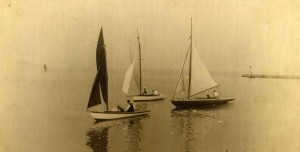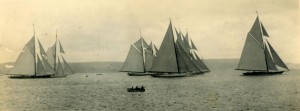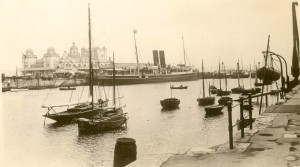1908 The Factotum Commodore
At a Committee Meeting in the clubroom at the Crown Hotel on April 6th, Mr. Bussell once more proposed that the club be renamed the Corinthian Sailing Club, ‘the meeting considering the word “yacht” to be somewhat misleading.’ This time his proposal was carried, and it was agreed that the club should appear in Hunt’s List under the new name, ‘provided that the cost did not exceed 6s.’
At the A.G.M., held at the Crown on August 17th, the Commodore was re-elected and Mr. E. Smith was elected to the joint office of Treasurer and Secretary, both the previous holders of these offices [Mr. Green and Capt. Wilder] having resigned.
Mr. Smith’s labours were short lived, however, for he resigned on October 2nd, and the books of both Treasurer and Secretary were taken over by the factotum Commodore [Col. Douglas].
Racing points for the 1908 season were awarded on the system that each boat completing the course of a race received one point, plus three points for a first, two for a second and one for a third place. The winner of each race received 5s.
The season’s racing resulted in a win for Clara with four firsts, [£1] and 12 points [£2-4s] second Waterwitch 10 points [£1] and third Argula owned jointly by Messrs. J. E. Pearce and H. G. Pitcher.
1909 Loss of Vice-Presidents
This season saw the formation of a new class of ‘honorary member’ at a subscription of 5s per season, which entitled them to enter and sail a boat in any club race on payment of 1s per race. The project, however, does not appear to have netted much income.
At the A.G.M. the temporary-acting-joint-Hon.Secretary-Hon-Treasurer-and-Commodore [Col. Douglas] reported that during the previous year the President and Vice-Presidents of 1907 had not been asked, before the opening of the season, whether they would continue their support, and that appeals made to them at the end of the season had met with no success. As a result of this lamentable oversight, due doubtless to the many changes in the office of Hon. Secretary, the total subscriptions received amounted to only £6 16s. This loss of anticipated income from Vice-Presidents left a balance of a mere £1 10s. 6d. which, said Col. Douglas, would not cover the working expenses for the season without a guarantee of at least £4 in subscriptions.
It was decided, however, to carry on the racing programme as usual, and hope for ‘a small margin’ for cash prizes. The offices of Hon. Treasurer and Hon. Secretary were now entrusted to Mr. J. E. Pearse.
The election of a new President this year brought another familiar name to the club, that of Mr. Angus V. Hambro, of Milton Abbey [Conservative candidate for Dorchester].
The press report of the above meeting discreetly avoids any mention of financial anxieties, and after quoting a list of twenty-four Vice-Presidents including such influential names as Major Devenish, Capt. Foster, Mr. H. J. Groves, Mr. V. H. Bennett, and Mr. R Ayles [the Harbour-master] says:-‘Owing to the number of small racing craft that are now attached to the port ofWeymouth, and the fact that four or five of the officers of the Royal Engineers, Royal Garrison Artillery and Somerset Regiment have purchased craft and propose sailing with the club, a successful season should be assured, and we have no doubt the local “cracks” will have their work cut out to maintain their reputations. We understand that the Poole, Bournemouth and Bridport clubs are also particularly strong this season.’
A second newspaper-cutting phrased this less happily:- Officers of the RE., RG.A. and S.L.I. have acquired “cracks”.
On May 12th, we read, Mr. Hambro offered a Silver Challenge Cup, to be won three times in aggregate or twice in succession. This cup was presented to the club at a special meeting held on June 7th 1909. At this meeting it was agreed to present ‘photographs’ [see later] as second and third prizes in challenge cup races and the Mayor was approached with a plea for a better flagstaff.
This season – the financial prospects of which appeared so black at the outset – appears to have turned out remarkably well, and was concluded by a lavish dinner and Prizegiving held at the Crown Hotel on November 25th, and recorded in a contemporary press-cutting.
Among those present at this noble gathering we note such familiar names as Capt. Masters, Mr. Percy Graham, and Messrs. Gosney, Rowe and Steadman while those sending apologies included Major Devenish, Mr. Huxtable and Sir Alexander Pengilly.
After the company has disposed of a ‘capital spread’ and drunk ‘the loyal toasts with all honours,’ we read that the Mayor [Alderman W. Gregory] made a speech in which he said that he and his corporation [laughter] would do everything they could for the club. ‘They wanted the Corinthian Club, they wanted sailing vessels in Weymouth to attract the visitors.’ And he offered them a cup [value £5] ‘to be sailed for as they thought best.’ He then proposed the health of the club, which, he said, would be a valuable asset to Weymouth, a place which could not be rivalled on the South Coast.
Mr. Hambro responded suitably to this speech and Mr. Hurdle, who [as vice-president) also responded, expressed the opinion that it would be much better if the club adopted one class of boat, as it would give members opportunities for better seamanship [hear,hear].
At this point Mr. Hambro gave away the prizes, and here the report throws light on the ‘photographs’ previously referred to – they were pictures of Britannia, Meteor and ’20 tonners Racing’. Further toasts at this impressive dinner included ‘kindred clubs’, with mention of the Royal Yacht Squadron – Mr. Montague Guest having recently left the town – and of the Royal Dorset Yacht Club, regretting that the town could not see its way to presenting the usual cup, which had, in previous years ‘provided one of the finest sights in the Bay’ [presumably referring to the J-class yachts]. In the event of a similar default next year it was suggested that ‘the Corinthian Club should come forward and show a friendly feeling towards a club much older than their own.’
The press report finally records that ‘during the evening Mr. Mayo played violin solos, and songs were sung by Mr. Hambro, Mr. Graham, Mr. Hutchings and Mr. Pearse.’ – Those were the days!
1910 the End of the Corinthians
The A.G.M., held in the Guildhall on May 31st, appears to have been uneventful. The Balance Sheet was passed as ‘very satisfactory,’ and the first race of the new season was fixed for June 18th. The office of Commodore was left open, Col. Douglas having resigned.
The Mayor’s Cup [to be known subsequently as the Gregory Cup] duly materialized, and was scheduled for competition on Regatta day. When it came to handicapping this race, Mr. Bussell hit on a brilliant idea for ‘passing the buck’, proposing ‘that the handicap for the [Mayor’s] Cup be arranged by an outside authority such as the Yachtsman, Yachting World etc., upon the result of the season’s sailing, up to the latest date before the race that the fairest handicap can be based upon.’
The proposal was carried unanimously, and the Hon. Secretary was duly instructed [August 9th] to forward results for this purpose to the Yachting World.
Whether or not the Yachting World complied in this rather arbitrary request, history does not relate, for at this interesting juncture we reach the last page of the minute book, and no further records of the Corinthian Sailing Club appear to have been preserved.
This club had been an essentially Edwardian product and it is perhaps significant that its dissolution should have coincided with the death of the sporting monarch with whose accession it began, and whose peaceful era was now at an end.


